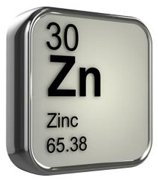Zinc - Uses, Benefits, Sources and Dosage

Zinc is also in the list of essential minerals which is required by the body. Zinc plays an important role for the healthy functioning of our body. It is found in the every single cell of body like in our bones, kidneys, Red blood cells (RBC), white blood cells (WBC), liver and pancreas. Zinc plays vital role in the functioning of more than 300 hormones and numerous enzymes in body. Zinc is also an integral component of most important antioxidants known as copper/zinc superoxide. These antioxidants help to neutralize free radicals thus help to increase the longevity. Thus zinc plays an important role for overall healthy functioning of body.
Benefits of Zinc
- It supports the healthy immune system.
- It helps in the proper synthesis of DNA which helps in wound healing and healthy growth and development during childhood.
- It plays an important role in the treatment of diarrhea.
- It helps in the regulation of neurons and supports the good memory.
- It helps in the treatment of common cold.
- It prevents the macular degeneration. It helps to prevent the cellular damage in retina.
- It plays an important role for fertility in both male and females.
- It helps in the repair of intestinal mucosa.
- It also improves the function of brain and provides the benefits to people who are suffering from Alzheimer's disease.
- It helps in enzyme regulation.
- It is aphrodisiac in nature and boosts up the testosterone.
Sources of Zinc
Seafood, animal meats, fish are the best sources of zinc. Pumpkin seeds, garlic, sesame seeds, lentils, broccoli, tomato, whole grains, cereals, bran, wheat germ contain the significant amount of zinc. Dairy products like milk, yogurt, cheese (Swiss, cheddar, Gouda, brie, mozzarella) are also the good sources of zinc.
Deficiency of Zinc
Inadequate amount of zinc in body results in the impairment of health. Zinc deficiency causes the anemia, loss of appetite, diarrhea, hair loss, nerve dysfunction, chronic fatigue, bad memory, slow wound healing and improper growth.
Zinc deficiency also leads to the reproductive complication in both male and females. In the case of females it can lead to irregular menstrual cycles, hormonal imbalance, improper maturation of eggs or its release from ovaries. Where as in the case of males, zinc deficiency can lead to low quality of sperms like poor sperm count, poor sperm motility and prostate enlargement.
Side Effects of High Zinc Intake
High intake of zinc also results in the health issues like loss of appetite, vomiting, nausea, headache, stomach pain and diarrhea.
Recommended Zinc Intake
Infants:-
- For 0-6 months require 2mg (milligrams)
- For 7-12 months require 3mg.
Children:-
- For 1-3 years requirement is3mg.
- For 4-8 years requirement is 5mg.
- For 9-13 years requirement is 8mg.
In adults
For males:-
- For Males 14 to 18 years zinc requirement is 11mg.
- For males above age of 19 zinc requirement is 11 mg.
For females:-
- For females 14 to 18 years requirement is 9mg.
- For females above age of 19 zinc requirement is 8mg.
- For pregnant mothers zinc requirement is 12mg.
- For lactating mothers zinc requirement is 12mg.

